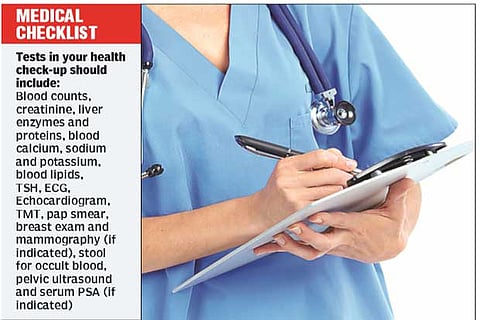

Chennai
Early detection of diseases like diabetes and high BP helps stall complications, if treated early. “Cholesterol problems” like high LDL (bad cholesterol), low HDL (good cholesterol) and high triglycerides can be detected only by blood tests. These are individual risk factors for heart disease, which is on the rise in India. The current recommendation is to get oneself screened for every year beginning from the age of 30 years.
The usual suspects: A few years ago, there was no method to screen for early cancer. These days, a certain cancer condition can be screened even before it has spread in an individual’s body. Cervical cancer and pre-cancer stages are detected by pap smear; endometrial biopsy is done to detect endometrial cancer if the endometrium is thicker than normal on an ultrasound; prostate cancer can be screened by blood PSA (though not routinely recommended); breast cancer can be screened for by mammogram after the age of 40 years.
Colon cancer screening (after 50 years of age) is done with stool exam for occult blood and if positive, a colonoscopy is planned. If normal, one needs to repeat it only after 10 years. Further, thyroid problems are common and the incidence of it is on the rise. Many people have no obvious symptoms of hypothyroidism but show marked abnormalities in their blood test. Thyroid problems cause abnormal metabolism, body swelling, hair loss, recurrent abortions, memory problems, heart rhythm problems and osteoporosis.
A TSH must be included in a routine health check-up. Blood calcium disorders are common in India with many people having vitamin D deficiency. Those with florid vitamin D deficiency have low calcium while those with mild to moderate deficiency keep their blood calcium normal due to extraction of calcium from bones. People taking calcium supplements for a longer time need to keep an eye on their blood calcium as it can exceed the upper limit of normal and can be dangerous for the heart and may even cause kidney stones.
Side effects: People taking medications like Ramipril, Olmesartan and telmisartan for high blood pressure need to watch their blood potassium once in 6 months as this can go dangerously high while on these drugs. Those taking medicines like hydrochlorthiazide and Lasix (frusemide) also need to monitor their blood potassium and sodium as these would tend to drop.
A blood creatinine is the test to detect kidney failures. One does not have symptoms of kidney failure until the last stages when nothing much can be done to prevent further damage to the kidneys and the patient can only be dialysed or have a kidney transplant. Certain diseases like kidney failure due to lupus and certain drugs, if detected early can be treated fully.
The progression of kidney failure can be slowed if treated early. Liver enzymes can be elevated in fatty liver due to alcohol intake, high sugar intake, high blood triglycerides and uncontrolled diabetes. It can also be temporarily elevated in viral infections and use of certain medications. If persistently elevated, a detailed work up must be planned to evaluate for chronic hepatitis. Blood alkaline phosphatase, another liver enzyme, can detect cancer of the bile tract and pancreas, sometimes earlier than symptoms appear.
It can also indicate osteomalacia and rickets. Blood total protein and albumin ratio can give a subtle indication of cancers like myeloma if abnormal. ECG, Echocardiogram and treadmill tests(TMT) are done routinely for those at risk for heart disease. While ECG and Echo may be normal, a TMT can detect heart disease and further measures to protect the heart can be planned. A chest X-ray, though routinely done in health check-ups is not recommended in screening for lung cancer and must be done only if symptoms warrant it, to avoid unnecessary exposure to radiation. Lung cancers, unfortunately cannot be detected early and by the time they appear on an X-ray, it already is too late.
Visit news.dtnext.in to explore our interactive epaper!
Download the DT Next app for more exciting features!
Click here for iOS
Click here for Android